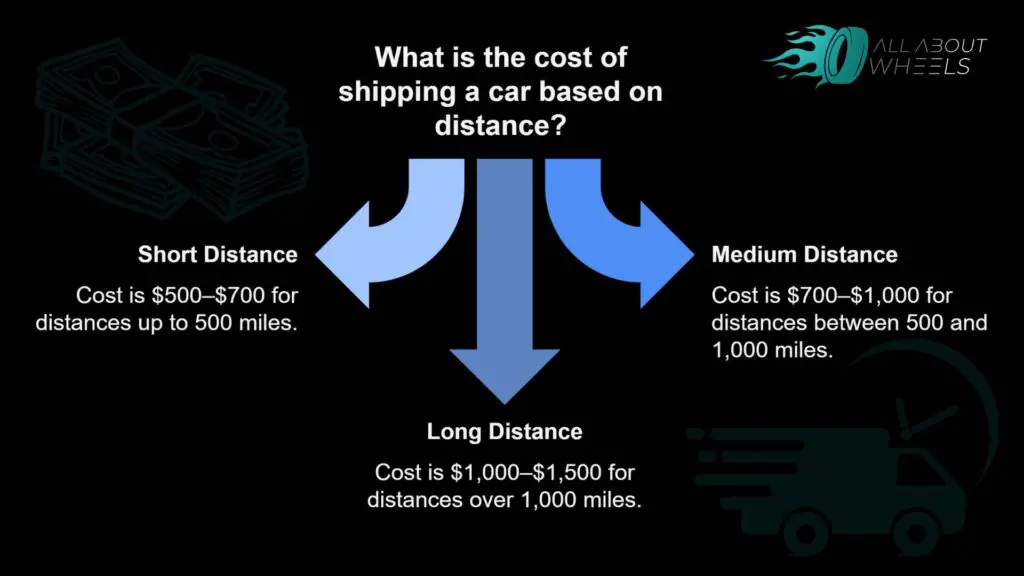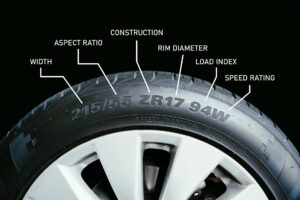Determining how much does it cost to ship a car involves understanding various factors that influence the overall price. From the distance of the transport and the type of carrier to the season and size of your vehicle, each detail plays a role in shaping the cost. In this blog, we’ll uncover the key facts and truths about car shipping expenses, so you can plan confidently and avoid surprises.
The car shipping cost typically ranges from $500 to $1,500, depending on factors like distance, vehicle size, transport type (open or enclosed), and seasonal demand.
Factors That Influence Car Shipping Costs
Figuring out the cost to ship a car is like solving a little puzzle with lots of pieces, distance, carrier type, and even the time of year all have their say. The good news? Choosing a professional car shipping service takes the edge off that dreaded driving stress and lets someone else handle the heavy lifting (literally). Whether you’re heading across the country or just to the next state over, these factors can shift the price, but knowing them upfront means no surprises down the road.
Distance and Route
The distance your car needs to travel is one of the biggest factors affecting the cost of shipping a car. Longer distances naturally come with higher fuel costs and more time on the road for the transport company, which increases the overall price. However, the route itself can make a surprising difference. Shipping along major highways or between large city hubs is often more affordable because these routes are commonly traveled and easier to navigate.
On the other hand, rural or remote locations may require detours or additional logistics, which can bump up the cost. If you’re shipping an electric car, the route might also need to factor in charging station access for safe loading and unloading at either end, adding another layer of planning.
Vehicle Size and Weight
When it comes to vehicle shipping, size and weight are huge considerations. Larger vehicles like SUVs, such as a Jeep Compass, often cost more because they take up more space on the carrier and add to the overall weight. Heavier loads increase fuel consumption, and carriers have weight limits that might restrict the number of vehicles they can transport at once.
Similarly, while classic cars and modern models might have similar dimensions, vintage vehicles may require extra precautions or handling that also affect the cost. Smaller cars, on the other hand, are lighter and easier to load, often leading to more budget-friendly pricing. Understanding these dynamics ensures you aren’t caught off guard by size-based charges.
Type of Transport – Open vs. Enclosed Carriers
The choice between open and enclosed carriers depends largely on your car’s value and how much protection it needs. Luxury cars, classic models, or vehicles with sentimental value often warrant the extra security of an enclosed carrier, which protects them from weather, road debris, and potential damage during transit. However, this premium service comes at a higher price.
Open carriers, on the other hand, are more economical and widely used for everyday vehicles. While open carriers do expose your car to the elements, they are safe, reliable, and ideal for those shipping modern vehicles without specific protection needs. Deciding between the two options comes down to weighing your car’s requirements against your budget.
Seasonal Demand and Timing
The time of year you choose to ship your car can have a significant impact on cost. Seasonal demand is a major driver, with summer often being the busiest and priciest season due to high relocation rates. Conversely, winter might see fewer people moving, but it comes with its own challenges.
The difference between winter and summer tires isn’t just about road grip. It’s about how weather affects the journey. Winter shipping can involve icy roads, potential delays, and fewer carriers willing to take on treacherous routes. However, with lower demand, you might find more competitive pricing. On the other hand, summer is ideal for smooth transit, but you’ll need to book early to secure a good rate.
Cost Breakdown for Car Shipping
When considering the cost of owning a car, shipping expenses can be a significant part of the equation, especially if you’re moving long distances or purchasing from afar. The total cost to ship a car isn’t just about the base price quoted by the shipping company.
In fact, there are additional fees that can pop up along the way. It’s a bit like planning a road trip in a family car. you will budget for gas and lodging, but then there are those unexpected tolls and snack stops that add up. Understanding the difference between base costs and extra fees can help you avoid surprises and keep your budget in check.
Base Costs vs. Additional Fees
The base cost to ship your car typically includes standard transportation from point A to point B. This covers the basics like fuel, driver wages, and general logistics. However, just as there are hidden costs of owning an electric car, there are additional fees in car shipping that you might not anticipate.
Need expedited shipping? That’ll cost extra. Shipping to a remote location? There might be an additional fee for that too. It’s important to ask the shipping company about any potential extra charges upfront so there are no surprises once your car is delivered.
Insurance Coverage and Its Impact on Price
Just like you’d prioritize automobile safety when buying a new or used car, considering insurance coverage during shipping is crucial. Most shipping companies provide basic insurance, but if you’re transporting a high-value vehicle, maybe one of the best import cars, or maybe some of the rarest cars in the world, you might want to opt for additional coverage.
This extra protection can increase the shipping cost, but it offers peace of mind knowing your car is safeguarded against unforeseen events. It’s a small price to pay compared to potential repair costs, especially when dealing with your prized possession.
Special Services for Luxury or Non-Operational Vehicles
If you’ve decided to buy a car online and have it delivered, especially if it’s a luxury model or a classic that’s not currently running, you’ll likely need special shipping services. Transporting luxury cars or totaled vehicles often requires specialized equipment and handling, which can bump up the price.
It’s similar to owning the world’s biggest car. It requires extra attention! Additionally, shipping an electric vehicle might involve specialized loading procedures. While these services add to the overall cost, they ensure your vehicle arrives safely and in the condition you expect.

Comparing Car Shipping Options
Choosing how to ship your car is almost as personal as deciding whether or not to buy an electric car, it depends on your needs, budget, and what makes you feel confident in the process.
Whether you’re shipping a Sedan electric car or a trusty family car, understanding your options can make all the difference in cost and convenience. From service methods to deciding between DIY and professional help, there’s plenty to consider when getting your vehicle safely from point A to point B.
Door-to-Door vs. Terminal-to-Terminal Services
Door-to-door shipping is like the premium option, it’s convenient, straightforward, and saves you the hassle of extra trips. The carrier picks up your car at your location and delivers it straight to your destination.
Terminal-to-terminal, on the other hand, is usually a cheaper option but requires you to drop off and pick up your car at designated locations. If you’re someone asking how many miles can an electric car go, terminal services might work best for shorter distances, while door-to-door is ideal for more comprehensive coverage.
Professional Transport Companies vs. DIY Shipping
When it comes to shipping your car, the costs of going the DIY route versus hiring professional transport companies can vary widely. If you’re thinking about driving the car yourself, you might save on the initial outlay but don’t forget to factor in expenses like fuel, accommodation, meals, and wear-and-tear on your vehicle. For example, a cross-country drive could easily cost $800–$1,200 in out-of-pocket expenses, not to mention the value of your time and the added driving stress.
Did you know that for a 1,000-mile trip, you are expected to spend approximately $500–$600 on fuel, meals, and lodging?
On the other hand, professional car shipping companies typically charge between $500 and $1,500, depending on the distance, transport type, and your vehicle’s size. While this might seem pricier upfront, it often ends up being more cost-effective when you consider the convenience and reduced risks. With experts handling your car, you avoid unexpected expenses and potential mishaps along the way.

How to Save Money on Car Shipping
Shipping a car can get pricey, but with a few smart strategies, you can keep your costs under control. From timing your shipment to choosing the most affordable transport option, there are several ways to save without compromising on quality.
Flexible Scheduling
Timing is everything when it comes to car shipping. Being flexible with your pickup and delivery dates can significantly reduce costs. Carriers often offer lower rates during off-peak seasons or when they can combine your shipment with others heading in the same direction. If you’re not in a rush, allowing a wider delivery window can help you snag a better deal and save on the average cost of shipping a car.
Choosing Open Transport
If you’re looking for an affordable option, open transport is the way to go. It’s the most common and cost-effective method, especially for standard vehicles. While enclosed transport provides added protection, it comes at a premium. For most cars, especially those used daily, open carriers are a reliable choice that keeps costs down. This is an excellent option if you’re curious about how much does shipping a car cost but don’t want to spend more than necessary.
Researching and Comparing Quotes
To get the best deal, take the time to research and gather multiple quotes. Each shipping company has its own pricing structure, and comparing options helps you avoid overspending. Keep an eye out for hidden fees and ask for an all-inclusive quote to avoid surprises later. Here’s a quick look at the average cost to ship a car based on distance:
- Short distance (up to 500 miles): $500–$700
- Medium distance (500–1,000 miles): $700–$1,000
- Long distance (1,000+ miles): $1,000–$1,500

In the End, It’s All About Your Car Shipping Needs
At the end of the day, the cost of shipping a car will depend on what works best for you. From the type of transport to the timing and distance, every decision is shaped by your unique needs and priorities. Whether you’re shipping a family SUV, a luxury ride, or even an electric car, understanding the factors at play ensures you can make the right choice for your journey.
With the right planning and a little research, you can navigate the world of car shipping like a pro. So, take a deep breath, map out your plan, and let the journey of getting your car from point A to point B feel a whole lot simpler.








